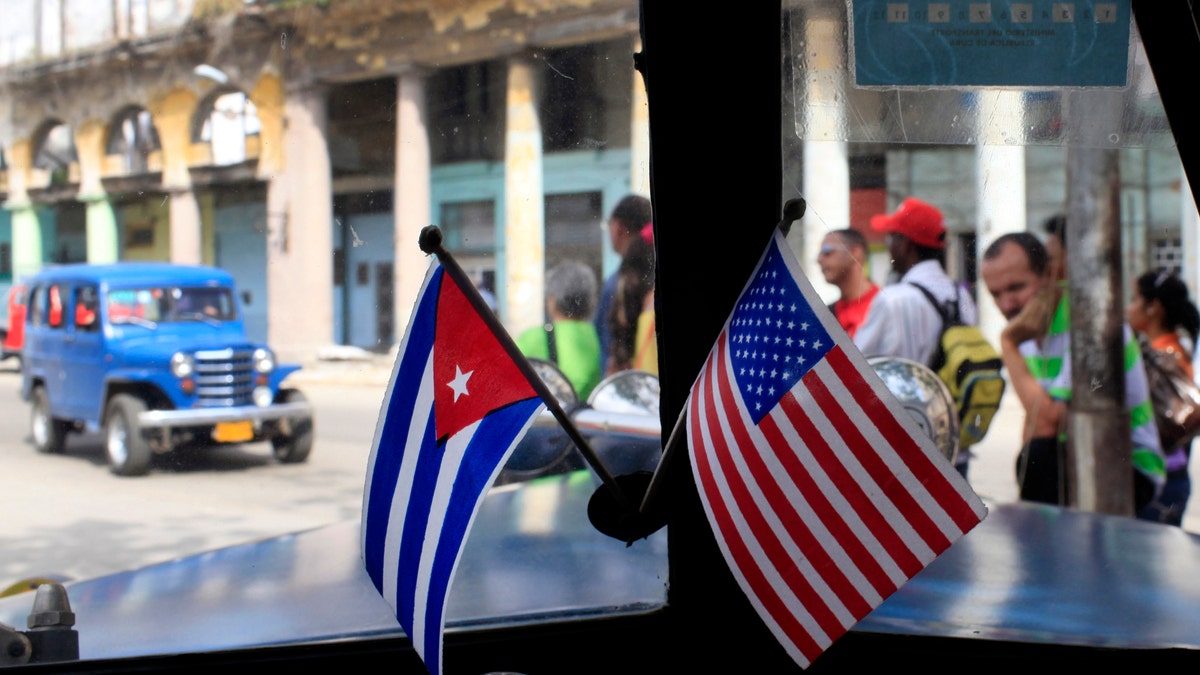
FILE - In this March 22, 2013 file photo, miniature flags representing Cuba and the U.S. are displayed on the dash of an American classic car in Havana, Cuba. The Obama administration is putting a large dent in the U.S. embargo against Cuba as of Friday, significantly loosening restrictions on American trade and investment. The new rules also open up the communist island to greater American travel and allow U.S. citizens to start bringing home small amounts of Cuban cigars after more than a half-century ban. (AP Photo/Franklin Reyes, File)
WASHINGTON (AP) – The Obama administration's lead negotiator with Cuba is vowing to maintain U.S. support for democracy and human-rights activists there as she pushes to restore embassies between the countries after a half-century interruption.
An Associated Press-GfK poll finds broad support in the United States for warmer ties with Cuba. Forty-five percent of those surveyed backed the re-establishment of full diplomatic relations between the Cold War foes, with only 15 percent opposing. Sixty percent backed the end of the U.S. economic embargo of Cuba, with 35 percent supporting its continuation.
Roberta Jacobson, the assistant secretary of state for Western Hemisphere affairs, is set to testify before the before the House Foreign Affairs Committee. On Tuesday she told a Senate panel that she planned more talks with her Cuban counterparts later this month. The administration had hoped to reach an agreement on new embassies by April's Summit of the Americas in Panama, though that looks unlikely.
Jacobson's trip to Havana last month made her the highest-level U.S. official to visit Cuba's capital in more than three decades. The talks encompassed the details of reconstituting embassies in each other's capitals, managing migration flows and the much larger process of normalizing ties between governments with unresolved issues such as fugitives and financial claims.
She said she raised several remaining barriers to full diplomatic relations during her Havana discussions, including U.S. resistance to any restrictions on American diplomats, shipments to the U.S. Interests Section and Cuban access to that building.
Concrete progress was limited, however. This month's talks are likely to be in Washington.
Seizing on comments made by Josefina Vidal, Cuba's top negotiator, after last month's talks, Sen. Marco Rubio, R-Fla., asked Jacobson for a commitment that the U.S. would continue backing activists after any agreement. In an interview with The Associated Press, Vidal had tied the establishment of embassies to reduced U.S. support for dissidents.
"We would not curtail the activities we're doing now," Jacobson answered.
In Congress, positions on Obama's sudden rapprochement with Cuba crisscross party affiliation and political interest.
Countering Rubio among Republicans was Sen. Jeff Flake of Arizona, who wants to end all U.S. travel restrictions to Cuba. Sen. Rand Paul of Kentucky, another Republican who supports the thaw, didn't show up for the hearing.
Among Democrats, California Sen. Barbara Boxer defended the Obama administration after Sen. Bob Menendez of New Jersey complained that the U.S. won no concessions from President Raul Castro's government and demanded that Cuba extradite a woman convicted of killing a policeman from his state. Both Rubio and Menendez are Cuban-Americans.
The AP-GfK poll found self-identified Democrats overwhelmingly in favor of restoring embassies and eliminating the U.S. embargo, which Obama has eased but only Congress can revoke.
Among Republicans, the blocs are closer. Thirty-four percent want diplomatic relations, with 30 percent opposed. Forty-nine percent want the embargo lifted, with 50 percent believing it should stay.
The AP-GfK Poll of 1,045 adults was conducted online Jan. 29-Feb. 2, using a sample drawn from GfK's probability-based KnowledgePanel, which is designed to be representative of the U.S. population. The margin of sampling error for all respondents is plus or minus 3.5 percentage points.
Respondents were first selected randomly using phone or mail survey methods, and later interviewed online. People selected for KnowledgePanel who didn't otherwise have access to the Internet were provided access at no cost.
Based on reporting by the Associated Press.
Like us on Facebook




